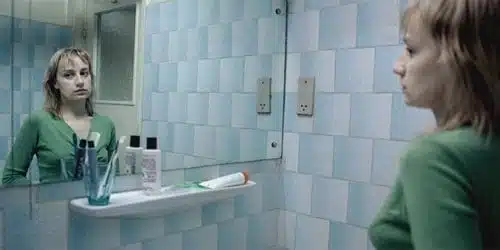
The clock is ticking in the very first moment of 4 Months, 3 Weeks and 2 Days. It’s Romania, 1987, and time is running down.
Gabita (Laura Vasiliu) is restless. Introduced in mid-conversation (“Okay, thanks…”), she smokes a cigarette, idly clears off a table. She’s on her way to an abortion, arranged through an acquaintance and illegal. Her roommate Otilia (the astounding Anamaria Marinca) tries to smooth over tensions, purchasing cigarettes and Tic-Tacs from the dorm’s rudimentary store, passing up the chance to take a kitten back to their room, because Gabita’s allergic. While Gabi waits inside, Otilia heads out into the grey city streets, hoping to secure a hotel room, according to the abortionist’s instructions.
As Cristian Mungiu’s camera follows Otilia during her brief, initial ventures, the context is not quite clear. At the first hotel, no one has a record of her reservation. Why, the second hotel clerk asks, does she need a room if she’s a student living in the dorms? Her identification card is out of date, the clerk notes, seeming to recede into the space behind her desk; Otilia faces trouble, “if the police get you.” Otilia makes her way through these serial snags with a certain resignation, tinged with frustration. The systems — all of them — are broken here, during Ceausescu’s last days.
At last Otilia finds a room, but soon learns it’s not at one of the hotels okayed ahead of time by the abortionist, Mr. Bebe (Vlad Ivanov). He looks at her from inside his small red car, his face obscured by shadows and his irritation manifest even from a distance: “Young lady, here’s the deal: I have nothing to hide,” he tells her, though it’s clear he does. “I came in my own car… but I will say this: trust is vital. I always meet the person first, to see if we trust each other.”
If the set-up to this point weren’t so bleak, Bebe’s earnest-seeming assertion would be laughable. “Trust” has nothing to do with his business. The routine he sketches is designed to his benefit, as he manipulates the girls’ fears and inexperience. And yet the film doesn’t so much judge as observe him. He’s petty and mean, but also scraping by in a political and financial economy that leaves him feeling bitter. At one point, the camera watches Bebe in long shot, remaining his car with Otilia; he stops off at his apartment to deal with his mother, locked out (“The wind blew the door shut,” she frets, while he shifts his weight, edgy and impatient). When the old woman adds, “Someone called,” Bebe barks, “Don’t answer when I’m out!”, a reaction that only hints at the pressures he’s feeling, whether looking out for her or covering up his own wrongdoings. In the car, Otilia’s own mounting tension is visible in the slight hunch in her shoulders, her taut face. The arrangement she’s made with Bebe cannot go well.
Brilliant and excruciating, the film (winner of last year’s Palme d’Or) builds gradually to a devastating sequence of events, as Otilia and Gabi soon find themselves inside the hotel room with Bebe. As he explains the procedure — as well as their payment options — they confront one bad option after another. Preparing Gabi, Bebe describes each step, along with her body’s likely responses: “I will insert a probe and it will cause an abortion; yes, it will hurt, there will be bleeding, but it will not require an anesthetic. The pain won’t be that serious.” Gabi listens, wan and withdrawn, but as the camera keeps all three figures in frame for long minutes, Otilia’s reaction becomes more compelling, as she’s increasingly, silently appalled by Bebe’s “conditions.”
Questions arise concerning the actual length of Gabi’s pregnancy and Bebe frames her deception as a betrayal of his “trust”: “You’re playing games with the months,” Bebe snarls, “It’s a new offense for the fourth month… They get you for murder, five to 10 years.” Pale and slender and desperate, Gabi can hardly handle the “deal,” unable to figure the cost or the changes Bebe makes, fast-talking and shady. As he comes to embody the regime’s wide-reaching, pitiless oppressions, Otilia is forced to make impossible choices. And yet she is not reduced to victim, but appears more a survivor, determined, angry, damaged.
Changes in her aspirations and self-understanding are both agonizing and sudden (the film takes place over a day, more or less). Leaving Gabi alone in order to keep a promise to her own boyfriend, Adi (Alex Potocean) that she visit with his family, Otilia is visibly distraught. Again contending with no good options, her face now more drawn and pale than at the start of the day, Otilia promises she’ll be back soon. Making her way across town by bus, through a cheerless night and menacingly empty streets, she arrives at the family home, where the mood is both utterly different and more of the same. Otilia looks trapped at the dinner table, barely hearing the conversation as the camera keeps her centered, surrounded by chirpy relatives. During a subsequent discussion with Adi — they’ve retreated to his bedroom, drab and no doubt the site of previous lusty embraces — Otilia comes to see herself differently. Now she sees her own risky sex with Adi as yet another form of oppression, born of his ignorance and unthinking self-interest, as well as her compliance. As the day finally ends for Otilia, so too does any illusion of security or trust.

